 |
Return to the Top of Workshop
The 1st CEFOM/21 International Symposium
Cultural and Ecological
Foundations of the Mind
Date: June 23 (Monday) - 26 (Thursday) , 2003
Location: En'yu Gakusha at Hokkaido University
Speaker:
Martin
Daly (Evolutionary Psychology, McMaster University)
Simon
Gächter (Experimental Economics, University of St. Gallen)
Reid Hastie
(Decision Science, University of Chicago)
Tatsuya Kameda (Social
Psychology, Hokkaido University)
Shinobu Kitayama
(Cultural Psychology, University of Michigan / Kyoto University)
Hazel Markus
(Cultural Psychology, Stanford University)
John Orbell
(Political Science, University of Oregon)
Peter Richerson
(Anthropology, University of California, Davis)
Margo Wilson
(Evolutionary Psychology, McMaster University)
Toshio Yamagishi
(Social Psychology, Hokkaido University)
Robert
Zajonc (Social Psychology, Stanford University)
The goal of this symposium was to promote intellectual exchanges on one
of the central questions in modern human sciences: how do human minds
and social/institutional arrangements
constitute a self-sustainable system? By "self-sustainable system," we
mean a system that is somewhat similar (but not necessarily equal) to
the notion of equilibrium
in the field of economics. More specifically, we would like to address
issues such as: 1) how to explain "cultural differences" in
psychological functioning, 2) how to analyze the relationship between
social and institutional arrangements and "cultural
differences" in psychological traits and/or cultural beliefs, and
3) how to analyze the ways in which evolutionarily-based psychological
mechanisms help (or constrain)
links between the institutional arrangements and "culturally specific" psychological
traits.
Day 1: Monday, June 23rd, 2003
10:30-12:30
Introductory remarks by each participant
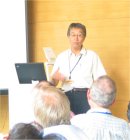  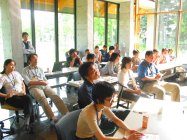
14:00-16:00
Session 1: Toshio Yamagishi
"Social Institutions and
Social Adaptation Tasks: An Error Management Approach"
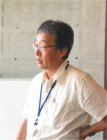 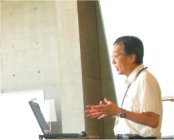
16:00-20:00
Reception & Poster Session
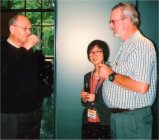 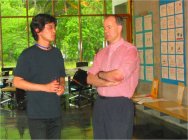 
 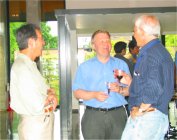
[Poster Presentations]
Kosuke TAKEMURA & Masaki YUKI
"Are Intergroup Relations Competitive in Japan?: A Test of Discontinuity
Effect in a 'Collectivist' Society"
Daisuke
NAKAMA, Shinobu KITAYAMA, & Beth MORLING
"Friendship and Selfhood: A Japan-US Comparison"
Rie
MASHIMA & Nobuyuki
TAKAHASHI
"The Emergence of Indirect Reciprocity"
Ryo
TAMURA & Tatsuya
KAMEDA
"Collective Vigilance and Anxiety Contagion: Exploring Adaptive Basis
of Our 'Anxiety-resonant' Minds"
Mayumi
MIYAHARA & Toshio
YAMAGISHI
"Social Construction of Groups: A Preliminary Study of Imposed Social
Identity"
Chisato
Takahashi, Shigehito Tanida & Toshio Yamagishi
"Is Beauty Skin Deep?: How Physical Attractiveness Affects Behavior
in Social Exchange"
Mizuho SHINADA
" 'Condemn the Offender, But Pity the Offense' Helps Solve the Tragedy
of Commons"
Toko
KIYONARI, Margaret FODDY, & Toshio YAMAGISHI
"Group-based Trust in the Minimal Group Situation: Comparison of Japanese
and Australians"
Naoto
SUZUKI & Toshio
YAMAGISHI
" 'Preference' for Conformity as a Default Decision Rule"
Kunihiro
YOKOTA & Masaki
YUKI
"Intragroup Cooperation and Intergroup Defense: Two Psychological Bases
of Ingroup Favoritism"
Shigehito TANIDA & Toshio Yamagishi
"The effect of cognitive empathy on accuracy in the prediction of behavior
in social exchanges"
Day 2: Tuesday, June 24th, 2003
9:30-11:30
Session 2: Hazel Markus
"Ways of Being: Sociocultural Diversity in Models of Agency"
 
13:00-15:00
Session 3: Shinobu Kitayama
"Focusing and Dividing Strategies of Attention: Constructor, Carrier, and Stabilizer
of Culture"
 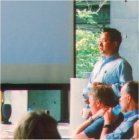
15:30-17:30
Session 4: Martin Daly & Margo Wilson
"Why are Homicide Rates
So Variable Between Times and Places?"
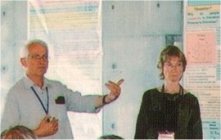  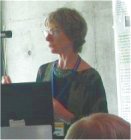
Day 3: Wednesday, June 25th, 2003
9:30-11:30
Session 5: Tatsuya Kameda & Reid Hastie
"In Search of a Sustainable Group Decision-Making Institution: The Robust Beauty
of the Majority Rule"
 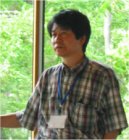
13:00-15:00
Session 6: Peter Richerson
"Did Climate Deterioration
Play Major Roles in Human Evolution?"
 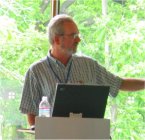
15:30-17:30
Session 7: Robert Zajonc
"Preferences"
 
Day 4: Thursday, June 26th, 2003
9:30-11:30
Session 8: Simon Gächter
"Measuring Norms of Cooperation
in Different Societies"
 
13:00-15:00
Session 9: John Orbell
" 'Machiavellian' Intelligence
as a Basis for the Evolution of Cooperative Dispositions"
 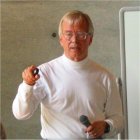
15:30-18:00
Wrap-up session
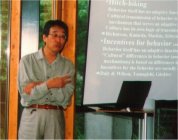  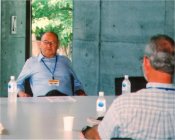
18:30-
Farewell dinner on
campus
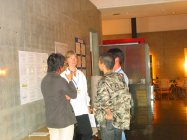 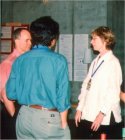
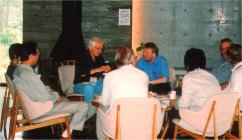
Return to the Top of Workshop
Return to Top
|
 |




